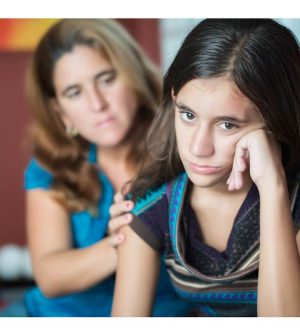- The Best Time of Day to Drink Bone Broth to Maximize Health Benefits
- 8 Ways to Increase Dopamine Naturally
- 7 Best Breads for Maintaining Stable Blood Sugar
- Gelatin vs. Collagen: Which is Best for Skin, Nails, and Joints?
- The Long-Term Effects of Daily Turmeric Supplements on Liver Health
- Could Your Grocery Store Meat Be Causing Recurring UTIs?
- Are You Making This Expensive Thermostat Error This Winter?
- Recognizing the Signs of Hypothyroidism
- 10 Strategies to Overcome Insomnia
- Could Artificial Sweeteners Be Aging the Brain Faster?
Pandemic Has Harmed Mental Health of Nearly Half of U.S. Teens: Poll

If your teenagers have been struggling to cope during the coronavirus pandemic, a new survey suggests they are far from alone.
Researchers found that 46% of 977 parents of teens said their child has shown signs of a new or worsening mental health condition since the start of the pandemic.
More parents of teen girls than parents of teen boys reported an increase in anxiety/worry (36% vs. 19%) or depression/sadness (31% vs. 18%).
Girls and boys had similar rates of negative changes in their sleep (24% for girls vs. 21% for boys), withdrawing from family (14% vs. 13%) and aggressive behavior (8% vs. 9%), according to the C.S. Mott Children’s Hospital National Poll on Children’s Health at Michigan Medicine.
“Just as young people are at the age of being biologically primed to seek independence from their families, COVID-19 precautions have kept them at home,” said poll co-director and Mott pediatrician Dr. Gary Freed.
“Pandemic-related lifestyle changes have wreaked havoc on teens’ lives, with many experiencing disruptions to their normal routines,” Freed said in a poll news release. “Our poll suggests that pandemic-era changes may have had a significant mental health impact for some teenagers.”
Research shows that teen depression during the pandemic is associated with teens’ own fears and uncertainties, as well as high levels of parental stress, according to Freed.
“Isolation during the pandemic may be triggering new problems for some teens but for others, the situation has exacerbated existing emotional health issues,” he said.
Three-quarters of parents said the pandemic has negatively affected their teens’ connections to friends, and 64% said their teens have been texting, using social media (56%), online gaming (43%), and talking on the phone (35%) every day or almost every day.
Few of the parents said their teens have been getting together in person with friends daily or almost every day, indoors (9%) or outdoors (6%).
“Peer groups and social interactions are a critical part of development during adolescence. But these opportunities have been limited during the pandemic,” Freed said. “Many teens may feel frustrated, anxious and disconnected due to social distancing and missing usual social outlets, like sports, extracurricular activities and hanging out with friends.”
Families should encourage social interactions that follow COVID-19 safety guidelines, such as spending time outside or participating in activities while wearing masks and socially distancing, Freed suggested.
The poll found that parents who noticed negative changes in their teens’ mental health tried different strategies to help their teen, including relaxing COVID-19 rules and family rules on social media, seeking professional help and using mental health apps.
“Parents play a critical role in helping their teens cope with the stress of the pandemic,” Freed said. “There are strategies parents can engage to help, whether or not their teen is showing signs of problems. One of the most important things for parents to do is keep lines of communication open; ask their teen how they are doing and create the space for them to speak honestly so they can provide help when needed.”
Of the 1 in 4 parents who sought help for their teen from a mental health provider, three-fourths felt it helped. One-third of parents talked to teachers or school counselors, and 57% of them said it was helpful.
“Teens may experience a wide range of severity of mental health problems, but if parents hear their teen express any thoughts of suicide or self-harm, they should seek mental health assistance immediately,” Freed said.
More information
UNICEF provides advice on teen mental health during the pandemic.
SOURCE: University of Michigan, news release, March 15, 2021
Source: HealthDay
Copyright © 2026 HealthDay. All rights reserved.










